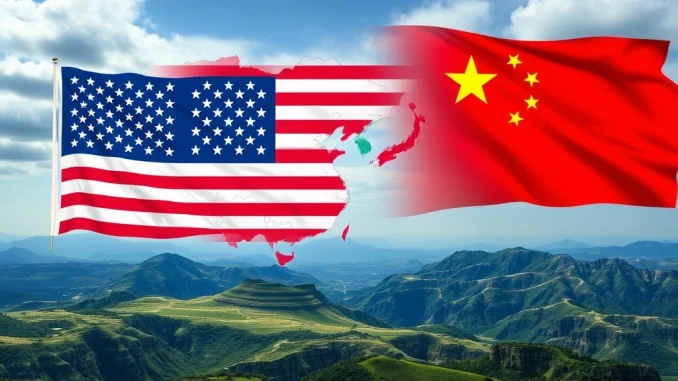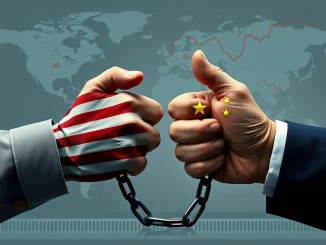
While the world of digital assets often feels distinct from traditional geopolitics, global stability and international relations significantly impact market sentiment, including the cryptocurrency space. Recent comments from the highest levels of the U.S. government regarding rising geopolitical tensions in Asia serve as a stark reminder that macro factors are always at play. Investors and market watchers pay close attention to such developments, as they can signal shifts in global power dynamics and potential economic ripple effects.
What Did the U.S. Secretary of Defense Say About Asia Security?
In a significant address at a recent Asian security conference held in Singapore, the U.S. Secretary of Defense, Pete Hegseth, delivered a pointed assessment of China’s regional objectives. According to details published on the official website of the U.S. Department of Defense, Secretary Hegseth articulated concerns that China is actively attempting to alter the existing situation in Asia through coercive means and the potential use of force.
His remarks highlighted a perceived ambition by China to become the dominant power in the region. Secretary Hegseth specifically stated that China seeks to dominate Asia and exert control over its neighbors and the broader regional landscape. This assertion underscores a fundamental divergence in the strategic outlooks of the United States and China regarding the future of the Indo-Pacific.
Understanding the Perceived China Military Threat
Secretary Hegseth did not mince words when describing the seriousness of the situation. He characterized the potential threat posed by China’s actions and ambitions as not merely theoretical but “real.” Furthermore, he added a sense of urgency to his warning by stating that the threat could be “imminent.”
This language suggests that the U.S. views China’s military modernization and assertive behavior in areas like the South China Sea and towards Taiwan as immediate concerns rather than long-term possibilities. The focus on the use of “force” to “forcefully change the current situation” points to worries about potential military actions or intense coercion that could destabilize the region.
Geopolitical Tensions and Their Broader Implications
The statements from the U.S. Secretary of Defense are not isolated but reflect growing geopolitical tensions between major global powers. These tensions have wide-ranging implications, extending beyond military strategy to affect international trade, supply chains, and global financial markets.
For those monitoring markets, including digital assets, understanding these macro-level shifts is crucial. Increased instability in a vital economic region like Asia could impact global economic growth, investor confidence, and the flow of capital. While crypto markets have their unique dynamics, they are not entirely immune to the effects of major international political and military developments.
Challenges Posed by Assertive Power
- **Regional Instability:** Attempts to forcefully change the status quo increase the risk of conflict.
- **Economic Disruption:** Geopolitical friction can disrupt trade routes, manufacturing, and economic partnerships.
- **Arms Race:** Warnings of an ‘imminent’ threat can accelerate military build-ups in the region.
- **Diplomatic Strain:** Relations between concerned nations become more fraught, hindering cooperation on other global issues.
Insights from the U.S. Perspective
Secretary Hegseth’s comments provide clear insight into the U.S. administration’s view:
The U.S. sees China’s actions not as benign growth but as a deliberate effort to dominate Asia through potentially aggressive means. The U.S. intends to highlight this perceived threat on the international stage, rallying allies and partners to counter China’s influence. The use of the word “imminent” suggests a heightened state of alert regarding potential flashpoints.
Why Does Aspiring to Dominate Asia Matter Globally?
Asia is a powerhouse of the global economy, home to major manufacturing hubs, critical shipping lanes, and large populations. Any significant shift in power dynamics or outbreak of conflict in the region would send shockwaves across the world. The U.S. perspective, as voiced by the U.S. Secretary of Defense, frames China’s ambitions as a direct challenge to the existing international order that has underpinned decades of relative peace and economic integration.
Maintaining a stable and open Indo-Pacific region is a stated priority for the United States and many of its allies. The warning about China’s desire to dominate Asia by force underscores the strategic competition playing out, which will likely continue to shape international relations for years to come.
Conclusion: Keeping an Eye on Global Horizons
The strong words from the U.S. Secretary of Defense regarding China’s intentions in Asia serve as a potent reminder of the complex and sometimes precarious state of global affairs. The assertion that the China military poses a “real” and potentially “imminent” threat to the region’s stability and the aspiration to dominate Asia highlights a critical area of geopolitical tension. While focused on defense and security, such high-level warnings ripple through international relations and economies. For participants in any global market, including the dynamic world of cryptocurrencies, staying informed about these macro-level developments is essential. Geopolitical stability is a foundational element of global markets, and shifts in power dynamics in key regions like Asia warrant careful observation.



